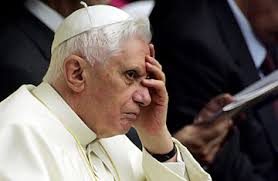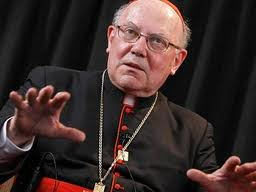BY THE PONTIFICAL ATHENAEUM OF SAINT ANSELM
ON THE 50th ANNIVERSARY OF FOUNDATION
Clementine Hall, Friday, 6 May 2011
Your Eminences,
Reverend Abbot Primate
Reverend Rector Magificent,
Distinguished Professors,
Dear Students,
I welcome you with joy on the occasion of the Ninth International Congress on Liturgy which you are celebrating in the context of the 50th anniversary of the foundation of the Pontifical Liturgical Institute. I cordially greet each one of you and in particular the Grand Chancellor, Abbot Primate Notker Wolf, and I thank him for his courteous words to me on behalf of you all.
Bl. John XXIII, in accepting the requests of the liturgical movement which sought to give a new impetus and a new breath to the Church’s prayer, shortly before the Second Vatican Council and during its celebration, wanted the Faculty of the Benedictines on the Aventine Hill to be a centre for study and research to assure a sound basis for the conciliar liturgical reform.
On the eve of the Council, in fact, the urgent need for reform in the liturgical sector emerged ever more acutely, also postulated by the requests made by various episcopates. Moreover, the strong pastoral demands that motivated the liturgical movement required that a more active participation of the faithful in liturgical celebrations be encouraged and elicited through the use of national languages. Also necessary was an in-depth examination of the subject of the adaptation of the rites in the various cultures and especially in mission lands.

In addition, the need for a more thorough study of the theological foundation of the Liturgy appeared clear from the outset, in order to avoid lapsing into ritualism or fostering subjectivism and to prevent the celebrant from making himself the centre of attention; and to base the reform firmly found within the context of the Revelation and in continuity with the tradition of the Church. In order to respond to these needs Pope John XXIII, inspired by his wisdom and his prophetic spirit, created the Liturgical Institute, which he immediately called “Pontifical” to denote its special connection with the Apostolic See.
Dear friends, the title chosen for the Congress of this Jubilee Year is equally significant: “The Pontifical Liturgical Institute, Between Memory and Prophecy”. As regards memory, we must note the abundant fruits generated by the Holy Spirit in half a century of history and let us thank the Giver of all good for this, despite the misunderstandings and errors in the practical implementation of the reform. How can we forget the pioneers, present at the act of the foundation of the Faculty? They were: Fr Cipriano Vagaggini, Fr Adrien Nocent, Fr Salvatore Marsili and Fr Burkhard Neunheuser who, in accepting the Pontiff-founder’s requests, committed themselves to a further examination, especially after the promulgation of the conciliar Constitution Sacrosanctum Concilium of the “exercise of the priestly office of Jesus Christ. It involves the presentation of man’s sanctification under the guise of signs perceptible by the senses and its accomplishment in ways appropriate to each of these signs. In it full public worship is performed by the Mystical Body of Jesus Christ, that is, by the Head and his members” (n. 7).
To the “memory” belongs the very life of the Pontifical Liturgical Institute, which has made its contribution to the Church committed to the reception of the Second Vatican Council, through 50 years of academic liturgical formation. Formation offered in the light of the celebration of the holy mysteries, of comparative liturgy, of the word of God, of liturgical sources, of the Magisterium, of the history of ecumenical requests and of a solid anthropology.
Thanks to this important formative work, a large number of those with degrees and licences now offer their service to the Church in various parts of the world, helping the Holy People of God to live the Liturgy as an expression of the Church in prayer, as a presence of Christ among people and as a constitutive feature of the history of salvation.
In fact, the conciliar Document sheds a clear light on the dual theological and ecclesiological character of the Liturgy. The celebration at the same time brings about an epiphany of the Lord and an epiphany of the Church, two dimensions that unite in the liturgical assembly, where Christ actualizes the Pascal Mystery of death and Resurrection and the people of the baptized draw more abundantly from the sources of salvation. The active presence of Christ subsists in the liturgical action of the Church: what he did as he went about among human beings, he continues to make active through his personal sacramental action whose centre is the Eucharist.
With the term “prophecy”, our gaze opens to new horizons. The Liturgy of the Church goes beyond the “conciliar reform” itself (cf. Sacrosanctum Concilium, n. 1), whose aim, in fact, was not primarily to change the rites and the texts, but rather to renew mentalities and to put at the centre of Christian life and ministry the celebration of the Paschal Mystery of Christ.
Unfortunately, perhaps, we too, Pastors and experts, understood the Liturgy as an object to be reformed rather than a subject capable of renewing Christian life, since “A very close and organic bond exists between the renewal of the Liturgy and the renewal of the whole life of the Church. The Church not only acts but also expresses herself in the Liturgy and draws from the Liturgy the strength for her life”. Blessed John Paul II reminds us of this in Vicesimus Quintus Annus, in which the Liturgy is seen as the vibrant heart of all ecclesial activity. And the Servant of God Paul VI, referring to the worship of the Church, affirmed with concise words: “From the lex credendi we pass to the lex orandi, which takes us back to the lux operandi et vivendi” (Address at the ceremony of the Presentation of Candles, 2 February, 1970, ORE, 12 Feb. 1970, p. 2).
The Liturgy, the summit toward which the activity of the Church is directed is at the same time the fount from which all her power flows (cf. Sacrosanctum Concilium, n. 10), with its celebratory universe thus becomes the great educator in the primacy of the faith and of grace. The Liturgy, a privileged witness of the living Tradition of the Church, faithful to its original duty to reveal and to make present in the hodie of human vicissitudes the opus Redemptionis, lives on a correct and constant relationship between healthy traditio and legitima progressio, which the conciliar Constitution has made lucidly explicit in n. 23.
In their programme of reform, the Council Fathers wished to maintain an equilibrium between both terms, a balance between the great liturgical tradition of the past and that of the future. Tradition and progress are often clumsily opposed. Actually, the two concepts merge: tradition is a living reality, which therefore includes in itself the principle of development, of progress. It is as if to say that the river of tradition also carries its source in itself and flows towards the outlet.
Dear friends, I trust that this Faculty of Sacred Liturgy will continue its service to the Church with a renewed impetus, in full fidelity to the rich and precious liturgical tradition and the reform desired by the Second Vatican Council, in accordance with the guidelines of Sacrosanctum Concilium and the pronouncements of the Magisterium. The Christian Liturgy is the Liturgy of the promise fulfilled in Christ, but it is also the Liturgy of hope, of the pilgrimage on its way to the transformation of the world, which will take place when God is everything to every one (cf. 1 Cor 15:28).
Through the intercession of the Virgin Mary, Mother of the Church, in communion with the heavenly Church and with the Patrons, St Benedict and St Anselm, I invoke the Apostolic Blessing upon each one. Thank you.








